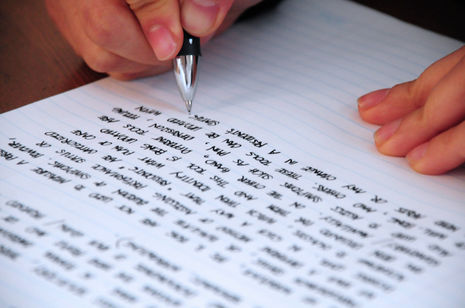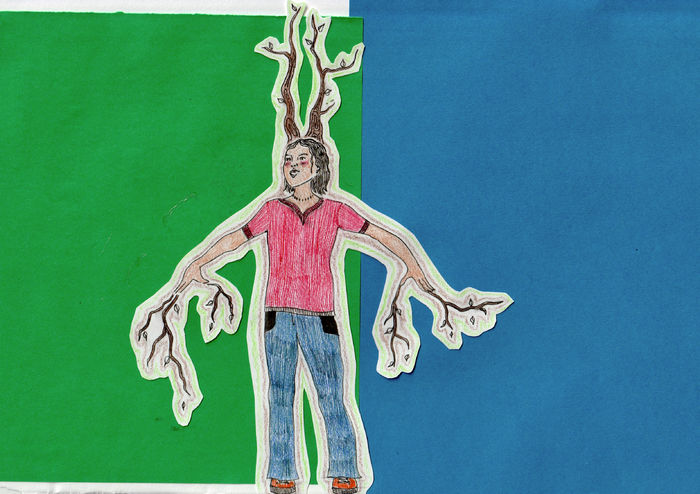Diary of a Playwright
In the first column in a series exploring writing for theatre, Tom Chandler reflects on research and process

I have a problem: my room is filled with books. The shelves are overflowing! My windowsill is consumed! Even the top of my drawers is engulfed by this ever-expanding collection. Gathering these books is one of my life’s passions, though this is putting it charitably – at times it feels more like a compulsion. Despite their sprawling appearance there is a method to my madness, I must tell myself. These books are my babies, they fill my heart with wonder and joy, and most importantly they make this small, characterless student accommodation feel like my home.
This may appear to be a strange way to start a column on writing, by talking about the writing of others, and how much of it I have amassed. However, for me, reading and writing are simply inextricable. One must read other good writers to become a good writer oneself.
I have always been involved in my local youth theatre, where I wrote/co-wrote two plays for them, which were both performed. Now I find that in between studying Classics at Selwyn, as I must for my degree, I have been focusing on honing the craft of a playwright rather than actually putting my productions on stage. The pandemic has certainly played a role in forcing my hand in this, but ultimately I think this has been incredibly useful for focusing me and helping me realise what I do and don’t enjoy within theatre.
“... for me, reading and writing are simply inextricable. One must read other good writers to become a good writer oneself.”
The Cambridge theatre scene has only encouraged this – I have found my creativity flourishing like never before, due to continual exposure to so many wonderful writers, actors, techies and producers. As such, I have two wonderfully exciting projects on the go right now, both at very different stages, and hopefully this column will serve as a diary of progress, talking through my various inspirations and my writing process.
My two focuses right now are research and revision; one of these plays is but a sapling in my mind, whilst the other is a tree that needs pruning and shaping into a gorgeous topiary. That initial inspiration is always wonderful to run with – it often puts a spring in my step – and it’s hard not to just tell the world about all my wonderful new ideas at once! I tend to find that it is advisable to avoid this however, as an idea shared often goes stale. My research process for historical plays is decidedly chaotic, made all the more so by the access to the innumerable books available to me at Cambridge. I will usually start by going down a twisting, winding Wikipedia rabbit hole, where I often get bogged down in the details – recently it was the correct classifications of monasteries. This is important for me as it helps me feel assured that the details of my characters and my setting are in place – if I know the details of a historical person’s life up until that point, it helps me characterise them a lot better.
I find you can also apply the same principle to fictional characters – give them a backstory. No one is ever the way they are ‘just because’. There are always reasons why the goodies want to be kind and the baddies want to be cruel. Does the audience need to know every detail of a backstory? No, probably not. But sometimes having an idea of your characters’ backgrounds and worldviews in mind helps to bring out many complexities. I much prefer working with historical characters because sometimes they are more interesting than anything I could have ever made up myself – but I still do a ‘research’ phase for pure fiction, which often is more about finding similar characters, setting a character’s aesthetic and coming up with a decent backstory for them in my mind.
“The physicality of having the script in my hands really helps me reconnect with it”
Editing is a different kettle of fish – often this includes being much more critical of your work and analysing its efficacy. Sometimes it can require restructuring or writing in/out a character as needs be. I think the core of editing though comes from a place of love. I often try and take time out between the first and second drafts of a script, so it sometimes feels like coming home to my babies that I made and love after a long absence. It truly does feel like sometimes you are helping a work grow beyond its bare bones and foundations, and blossom into something better.
My usual process is to print out a copy of the script and go ham with hand-written notes and highlights – every small change, every thought is captured on paper. The physicality of having the script in my hands really helps me reconnect with it, so it’s not just some electronic deposit floating on some server somewhere – but it’s real, and it’s here, and it’s mine. I also find that it really helps with any structural issues. If a scene needs moving, I can simply move the pages!
The term ahead looks promising – I hope to pitch the play currently under revisions to the ADC for Michaelmas, and I would really like to have made significant ground on the other script. As most people who engage with creative endeavours at Cambridge would probably tell you, finding time to write in the middle of a full time degree is always difficult, but I’m going to make a concerted effort this term, and bring you along with me for the ride!
 Features / Should I stay or should I go? Cambridge students and alumni reflect on how their memories stay with them15 December 2025
Features / Should I stay or should I go? Cambridge students and alumni reflect on how their memories stay with them15 December 2025 News / Cambridge study finds students learn better with notes than AI13 December 2025
News / Cambridge study finds students learn better with notes than AI13 December 2025 News / Dons warn PM about Vet School closure16 December 2025
News / Dons warn PM about Vet School closure16 December 2025 Comment / The magic of an eight-week term15 December 2025
Comment / The magic of an eight-week term15 December 2025 News / News In Brief: Michaelmas marriages, monogamous mammals, and messaging manipulation15 December 2025
News / News In Brief: Michaelmas marriages, monogamous mammals, and messaging manipulation15 December 2025









